The Champion #110 – September 2022
This issue:
- Join Australia’s Biggest Quiz… make hep C history!
- Hep B and hep C… NOT transmitted through saliva
- It’s Your Right campaign launches in NSW
- Where is the response to the Ice Inquiry?
- Testing and treatment keeps local community safe from hep C
- Dr Thomas Tu recognised for outstanding work in hep B field
- Daily Dose podcast tells stories from people who inject drugs

Join Australia’s Biggest Quiz… make hep C history!

Hepatitis Australia is holding Australia’s Biggest Quiz, a national community event to raise awareness of hep C and its cure. As part of its hep C elimination strategy, Australia aims to find and cure 50,000 people of the virus by 2023 and this quiz will help spread the word and achieve that goal. Hepatitis NSW, along with the other state and territory hepatitis organisations, are partners in this event.
Australia’s Biggest Quiz is a national trivia event, and anyone can register to participate. Participants can test their general knowledge of topics such as sport, history, music, geography and much more. The aim is to break a world record (for “The Most People Participating in a Quiz”) and to raise awareness of hep C, and its cure, along the way.
There will be 16 live locations across regional Australia. Too often, regional areas miss out on health campaigns and as a result don’t learn about the latest innovations or treatment. Regional communities are often great sources of support and, when empowered with information, can achieve great things. Sixteen regional communities have been identified where hep C info and access to support is needed – in New South Wales those are Gosford, Dubbo and Goulburn, with Blacktown as an outer metro location. Hepatitis NSW will have resources at those sites, and staff will be able to answer questions from the community.
People who can’t make it to a live event can participate online as part of the national virtual audience. The Quiz will take place across the nation on Wednesday, October 26 – kicking off in New South Wales locations from 7.00pm. Info on the live sites will be in the October edition of The Champion and also via our Facebook page.
MORE INFO & REGO>>> CLICK HERE
Hep B and hep C… NOT transmitted through saliva
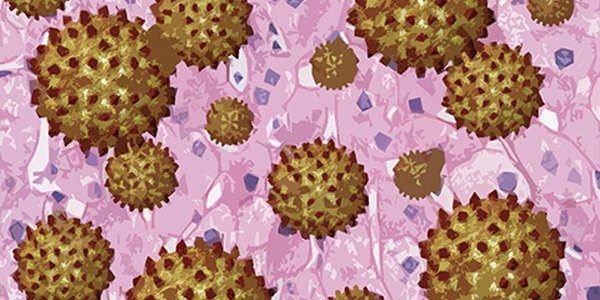
(Recent news articles published in Queensland and the Australian Capital Territory have incorrectly suggested that hep C and hep B can be transmitted through saliva. Hepatitis Australia and the Australasian Society for HIV, Viral Hepatitis and Sexual Health Medicine (ASHM) have issued this public statement in response.)
No one should be spat on; however, media and other bodies have a responsibility to not spread misinformation. Misinformation about viral hepatitis transmission increases stigma and discrimination and causes undue stress for police officers, bus drivers and other workers if they incorrectly believe they could be at risk.
Hep C is transmitted only when sufficient quantities of blood of an infected person enter the bloodstream of another person. Hep B is also transmitted this way, and sexually.
A 2018 literature review to clarify the risk of viral hepatitis infection through biting and spitting searched nine international medical journal databases and identified only one case anywhere in the world where hep B transmission through spitting was considered plausible.
The evidence shows that saliva can contain but not transmit blood borne viruses unless there is sufficient blood. Even then, the risk of transmission of these viruses to police, bus drivers and other workers in the community via occupational exposure is negligible.
In the unlikely event that a police officer, bus driver or other worker is exposed to a plausible risk of contracting a blood borne virus through occupational exposure:
- hep B is vaccine preventable. For those who have not been vaccinated or exposed previously, hep B is resolved naturally (i.e., ‘cleared’, without treatment) by 90% of adults. There is also a post-exposure treatment available for hep B, which further reduces the chances of infection.
- hep C is curable, and in most cases requires only 8-12 weeks of tablets.
- officers or frontline workers are not faced with the often claimed “agonising six-month wait” to find out whether they are infected.
According to the Australia New Zealand Policing Advisory Agency and ASHM, all officers:
- should be vaccinated against hepatitis B to protect themselves and others; and
- are required to show proof of immunity and/or age-appropriate vaccination.
Read original statement>>> CLICK HERE
It’s Your Right campaign launches in NSW
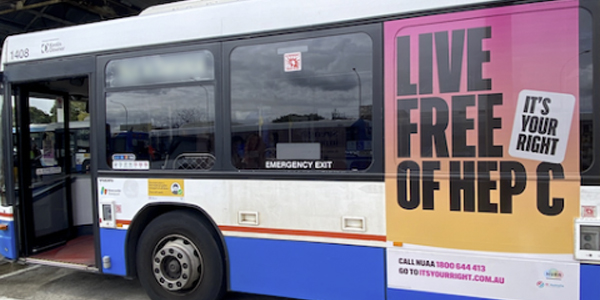
The New South Wales leg of the national It’s Your Right campaign launched on August 15 and is rolling out in inner Sydney and Newcastle until November 15. It’s Your Right promotes hep C testing and treatment to people who inject drugs. It lets people know that the new treatments are easier, have less side effects, can be taken while using drugs, and that people can be treated again if they are reinfected.
The campaign will run for three months, using posters, street advertising including buses (see pic above), and a website to raise awareness about treatments, encouraging people to connect with their local Needle and Syringe Program (NSP). Participating NSP programs will also run free and confidential testing days. As part of the campaign, peers will be out on the ground to talk to people about treatment and will be providing quick and easy testing for hepatitis C at key outreach events.
People who inject drugs can miss out on treatment through hesitancy, or due to barriers including discrimination and stigma. It’s important for people to understand that hep C treatment can cure the infection meaning they get rid of the virus from the body in 8-to-12 weeks, and there are no injections required. Anyone with hep C can access the treatment, known as Direct Acting Antivirals (DAAs) and they can be prescribed by general practitioners.
The It’s Your Right campaign rollout is supported by Australian Injecting & Illicit Drug Users League (AIVL) and the Eliminate Hepatitis C Australia Partnership (EC Australia) – of which Hepatitis NSW is a member – and is led by the Burnet Institute. EC Australia is working towards eliminating hep C as a public health threat in Australia.
It’s Your Right website>>> CLICK HERE
Where is the response to the Ice Inquiry?
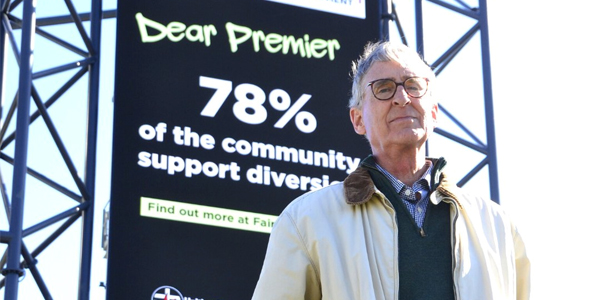
It has been thirty months since Commissioner Professor Dan Howard tabled his recommendations for the NSW Government’s 14-month, $10.8 million Special Commission of Inquiry into the drug “Ice”. Since then, those 109 recommendations are yet to be implemented.
The Fair Treatment campaign was formed by the Uniting Church NSW/ACT and Uniting, and now embraces more than 65 partner organisations including Hepatitis NSW. We all want to live in a world where everyone is treated with dignity and respect, including people who use drugs. To achieve this there needs to be increased access to treatment services, especially in rural and regional areas, and also a compassionate health-based response to drug dependency.
As part of a strategy to raise pressure on the NSW Government to act, Fair Treatment is using a major Sydney billboard to highlight that the majority of Australians support health-based responses to drug use. Professor Dan Howard, Commissioner of the Ice Inquiry, was photographed (see image above) standing in front of the Fair Treatment billboard, which states, “Dear Premier, 78% of the community support diversion”. Simply, it is time for policy to catch up to public perception.
A website has been launched by NUAA to highlight the current inaction on this important community health issue: wherestheresponse.com.
Fair Treatment website>>> CLICK HERE
Testing and treatment keeps local community safe from hep C
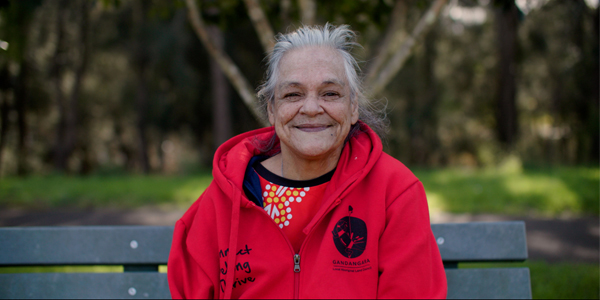
South Western Sydney Local Health District (SWSLHD) has partnered with Gandangara Aboriginal Land Council to eliminate hep C in Liverpool and surrounding areas and is encouraging people to know their hep C status.
Proud Worimi woman Debbie Robinson (pictured left) is enjoying a new lease on life after being cured of hep C and she urges Aboriginal and Torres Strait Islander people in south western Sydney to get tested even if they have no symptoms.
She completed the 8-to-12-week treatment program at Gandangara Health Service in Liverpool and said the service was easy to access and delivered in a culturally safe way. “I had a blood test, the doctor told me I had hep C and I felt numb. Then the doctor told me I had ten years to live. I went to Gandangara, and they helped me to access treatment right away,’’ Debbie said.
“If it wasn’t for Gandangara, I wouldn’t be here. I wouldn’t have done anything about it because I felt healthy. I felt supported every step of the way at Gandangara. I’m cured and have a long life ahead of me. I’m proud of myself and my family is proud of me too.’’
Even though new hep C treatments have a 95% cure rate, Kirby Institute modelling suggests there are still around 40,000 people living with hep C in NSW. Within South Western Sydney the number is estimated to be almost 6,000. People living with hep C can avoid liver damage – including cirrhosis and cancer – and go on to live long and healthy lives after being cured of the virus.
The SWSLHD-Gandangara partnership is encouraging more members of the Aboriginal community in South Western Sydney to get tested and treated. Nathan Jones, District Aboriginal Health Director, said, “Let’s make a change and do all we can to eliminate hep C. There is no shame or stigma in getting tested for hep C.”
Melissa Williams, Gandangara Aboriginal Land Council CEO, said hep C testing is part of routine screening at Gandangara by the service’s valued clinicians. “People can come into Gandangara and have a confidential yarn with a GP, nurse practitioner and/ or First Peoples Health Practitioner to arrange for testing and/ or to get more info about treatment.’’
Gandangara Health Services website>>> CLICK HERE
Dr Thomas Tu recognised for outstanding work in hep B field
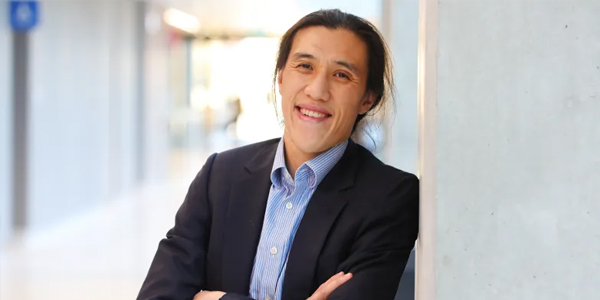
The Young Tall Poppy Science Awards is an initiative of the Australian Institute of Policy and Science to recognise excellence in research and enthusiasm for communicating science beyond the walls of the laboratory. The Awards can be an early indicator of Australia’s future scientific leaders, identifying excellent early career scientists.
Dr Thomas Tu, who works in the field of hepatitis B, is one of the award recipients for 2022. Thomas, who works with the Sydney University Faculty of Medicine and Health and the Westmead Institute for Medical Research, is a leading researcher on the hep B virus.
Thomas has committed his career to understanding the virus, as he himself lives with hep B.
His research focuses on translatable, effective, and practical outcomes, motivated by the belief that “it’s not enough that research be published; it must also have an impact on society”.
His research into liver cancer and the hep B virus have led him to be considered a world-leader in sensitive and specific detection of hep B viruses.
He currently leads a research group at the Westmead Institute for Medical Research in the Storr Liver Centre where he links molecular biology expertise with cell culture models and patient samples from Westmead Hospital to answer clinically relevant aspects of hep B pathogenesis.
Hepatitis NSW has worked with Dr Thomas Tu for several years. His proactive approach to engage affected communities led to the development of an online forum – hepBcommunity.org. We interviewed him last year for a video in which he talks about his life with hep B and his work around the virus. Congratulations, Thomas, this award and recognition is greatly deserved.
Daily Dose podcast tells stories from people who inject drugs
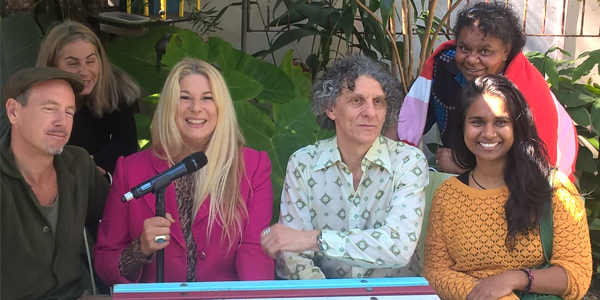
A new ground-breaking podcast series – The Daily Dose – is striving to reduce stigma towards people who inject drugs, as a way of improving their access to health services, their wellbeing and treatment outcomes. This initiative is a continuation from North Coast Public Health work since 2016 to address stigma and discrimination against people who inject drugs in health care settings.
The Daily Dose series meets a number of NSW strategic objectives relating to awareness of stigma and discrimination. Also, by breaking down perceptions, stereotypical beliefs and understanding of the issues faced by people who inject drugs and people living with hep C, the podcast helps increase access to hep C treatments.
To help change attitudes, the North Coast HIV and Related Programs (HARP) team joined forces with the Daily Dose Podcast Crew of Mandy Nolan and Dr George Catsi and created a podcast series with stories by people who inject drugs as well as shared experiences from health experts including Dr Alex Wodak and Prof. Carla Treloar.
The podcast series was launched state wide, in Sydney, by Dr Kerry Chant as part of Hepatitis Awareness Week on World Hepatitis Day. A local launch involving key podcast supporters and podcast story tellers (pictured above) was held on August 4 at Brunswick Heads.
The Daily Dose>>> CLICK HERE









